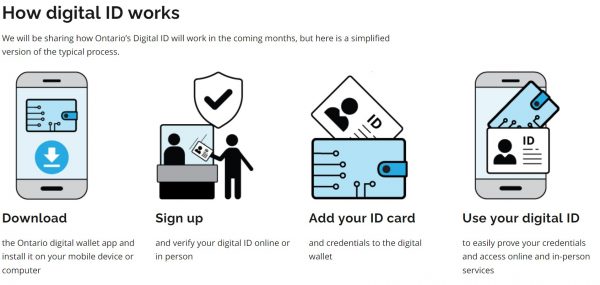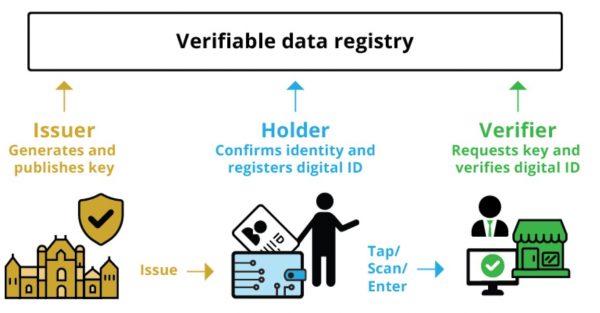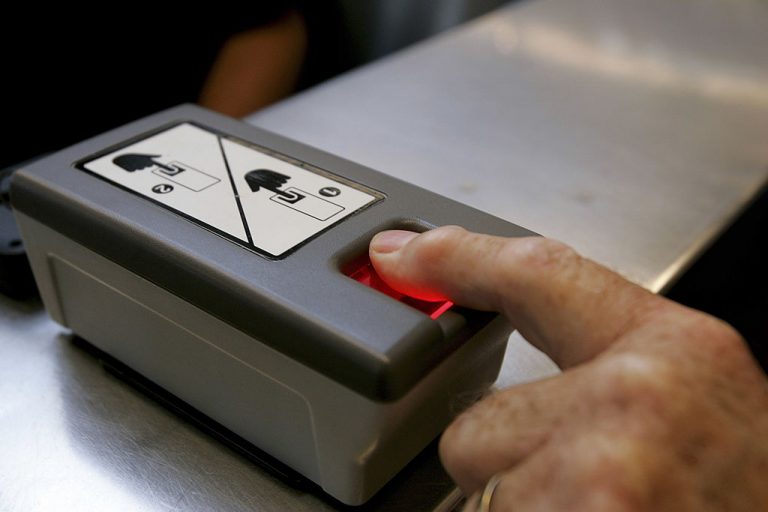The Canadian provinces of Ontario and Alberta are on the cusp of transforming the traditional card-based government identification systems into a web-based, cellphone-oriented identification system, generally referred to as digital identification or a digital ID.
Both provinces, each governed by Conservative Parties, currently have public-facing websites devoted to the initiative, which touts itself as a modern day improvement over existing card-based identification systems.
However, in the wake of how governments responded to the Coronavirus Disease 2019 (COVID-19) pseudo-pandemic, including the deployment of measures such as extensive and long running lockdowns in Ontario’s case, the implementation of social credit-style vaccine passport social segregation regimens all across Canada, and the markedly un-Canadian and authoritarian handling of Freedom Convoy protests in both provinces, both public weariness and suspicion—and support for more measures—are at a high.
Ontario Digital ID
The Government of Ontario’s official website defines its new Digital ID initiative as “an electronic version of trusted government identification that provides better safety, more security and stronger privacy than physical identification cards or documents.”
The benefits, the Government proclaims, is that your ID can be stored in a “digital wallet app” on your phone, tablet, or computer, for the purposes of having both “people and businesses prove who they are both online and in person.”
SOCIAL CREDIT AND FREEDOM CONVOY
- Ontario Courts Target Cryptocurrencies In Extension of $20 Million Freedom Convoy Asset Freeze
- Canada’s Attorney General Says Being ‘Pro-Trump’ a Criteria for Bank Account Seizure Under Emergencies Act
- Behind Aubrey Cottle, the Man Claiming Credit for the GiveSendGo Hack
- Canadians’ Bank Accounts Reportedly Frozen Over Small Freedom Convoy Support, MPs Speak Out
Success
You are now signed up for our newsletter
Success
Check your email to complete sign up
The Doug Ford Administration claims the new world of Digital ID will “enable easier access to online services” and bring economic prosperity by making Ontario “one of the world’s most digitally advanced jurisdictions.”
The page emphasizes a “value” brought to “Ontarians, businesses and the government” of a staggering $20 billion.
In a footnote associated with the $20 billion figure, the Government denotes the number is a “rough-order-of-magnitude estimate calculated from about 35 value drivers and hundreds of data points” provided by the Digital ID & Authentication Council of Canada, McKinsey Global Institute, and no less than the international globalism round table World Economic Forum.

The landing page for Ontario Digital ID is acute to point out that your personal identification is not stored in a central government database, the app does not moonlight as a tracking device, and that your credentials will not be shared without your permission.
In a subsection titled Why Now? the Government claims that Digital ID is needed because physical ID cards “were not designed for the safety and security needs of the digital world.”
“Current solutions, like scanning your driver’s licence and sending it by email are inconvenient and insecure,” they state.
Additionally, the Ford Administration seizes on the pretext of COVID lockdowns and measures as a crucial selling feature of Digital ID as it states, “Ontario’s Digital ID will mean more businesses that require customer identification will be able to move their services online.”

On the Ontario Digital ID technology and standards page, the Government of Ontario explains that the system is based on a proprietary blockchain system where “public cryptographic keys associated with that digital ID” will be published to a “verifiable data registry, which uses distributed ledger technology” based on Web3 standards.
According to the Getting Involved portion of the Government’s website, last updated Nov. 18, 2021, Ontario is already on step 4 of 4 of implementing the system, having completed the “policy framework” stage as of the end of September of 2021.
Meanwhile, a “market engagement on technology” stage has been ongoing since July of 2021 that is described as “getting feedback from leaders in key market segments including banking, innovation, education, identity networks and more.”
The Government claims that “as we gear up to release the first iteration of Ontario’s Digital ID” it will “share and get feedback on our technology approach,” poll the public, “conduct user research and testing” on implementation methods, and share consultation results.
Alberta Digital ID
Alberta’s version of a Digital ID system, coined MyAlberta Digital ID, similarly describes itself as “a free account that lets you prove who you are online without paper documents or face-to-face visits.”
“MyAlberta Digital ID gives you seamless access to a growing range of government sites and services, while protecting your information and privacy,” it adds.
Currently, the MyAlberta system allows residents to sign up with just an email address for a “basic account” that can be upgraded later to a “verified account” with the addition of a driver’s license or other ID card.
ALBERTA’S PANDEMIC RESPONSE
- Canadian Provinces Begin Relenting on Mandates Amidst Ongoing Freedom Convoy Protests
- Will Jason Kenney’s Vow Against Mandatory Vaccination Ring Hollow As It Did With Vaccine Passports?
- COVID Curriculum for Calgary Grade School Students Panned as ‘Propaganda’ by Parents
- ‘A Jail-like Environment’: Fully Vaccinated Mother Describes Calgary ‘Confidential Federal Quarantine Site’
The Government of Alberta touts use cases for the Digital ID system as aiding with access to federal services such as My Service Canada, which delivers EI and CPP, and the Canada Revenue Agency’s MyAccount.
A litany of other provincial services, such as MyHealth, which stores vaccine passport information, Alberta Student Aid, Employment Standards complaints and appeals, and even a fines search are also integrating with the Alberta Digital ID protocol.
Users can even access the Service Dog Information System, allowing citizens to apply for a service dog.
MyAlberta Digital ID claims it is safe and emphasizes privacy because only the “information required to create and verify your digital ID” is stored.
The Province also undertakes to not log when and where credentials are utilized, as well as limiting what information is provided to the end users.
In a Common Questions page, the Government explains the Alberta Digital ID initiative verifies online credentials against real credentials using a process based on the Pan-Canadian Trust Framework and uses the Transport Layer Security protocol for security.
Digital ID as a foundation for social credit
The foundation of the infamous social credit score harkens directly back to the way of governance under the modern Chinese Communist Party (CCP) and the mode of life citizens are subject to.
These are most recently seen in the case of China’s most populous city, Shanghai, utilizing the pretext of COVID-19 to put an entire country-sized city of 26 million citizens under indefinite house arrest starting in late March.
Big data and social credit do not replace the Party as the central authority…Developments in those fields seek to augment existing processes for social and political control, which are visibly and invisibly hosted through everyday social and economic activity.
Rethinking Security: China and the Age of Strategic Rivalry, 2018, Canadian Security Intelligence Service (CSIS) website
The decision was not without its consequences for both people and the Party.
Supermarkets quickly ran out of food, as residents are not permitted to leave for any reason, leading to the deployment of military personnel and footage of the notorious hazmat-suit stormtrooper-esque community grid manager “volunteers” beating locked down residents who quickly reached their wit’s end.
GLOBAL SOCIAL CREDIT INITIATIVE
- Italy Foreshadows Mandatory Vaccines and Expansion of Passports to Supermarkets
- 100 German Homes Raided Over Internet Criticism of Government Officials
- Forget Vaccine Passports – UK Government to ‘Monitor Family Supermarket Spending’ in Social Credit-Style Anti-Obesity Campaign
- French Protest as Macron Announces ‘Health Pass’ Vaccine Passport Mandatory for Nearly All Public Life
A rash of suicides has occurred, many caught on camera, in addition to parents being separated from their children as people are held in state-run quarantine camps that revive the imagery contained in many 20th century dystopian novels.
By late April, Shanghai CCP organs finally relaxed restrictions, allowing four million people to go outside for the first time in nearly a month, only to renege two days later as Xi Jinping continues to push ahead against all odds with a failing “Zero-COVID” policy.
Not only is Digital ID a foundational element for the system of total technocratic surveillance and control that is the CCP’s social credit system, but mainland China is the erstwhile poster child of the very same technocracy countries composing the International Rules Based Order wish to deploy on their own citizens.
Generally speaking, social credit involves linking a human being’s natural, real-world identity with Internet services. Afterwards, crucial elements needed to live in a technology-based society, such as your bank account, are linked together with your Digital ID.
As the deployment progresses, Digital ID becomes required to sign up for and utilize services that today are anonymous, such as online games and social media.
As the process evolves, in countries such as China, and to a lesser extent, Ukraine, national currencies have been eliminated in place of a central bank digital currency (CDBC).
A key feature of CDBCs is that, unlike normal currency that works as a simplified modern form of traditional bartering, they are programmable.
A particularly apt example is found in Ukraine’s Diaa app, which provides “money” to users in exchange for regime-encouraged good behavior, such as accepting a COVID gene therapy injection, but the money serves as a manifestation of a command economy and can only be spent on pre-approved items, such as books.
REAL WORD SOCIAL CREDIT IMPLEMENTATIONS
- This Social Credit-Style Digital Currency App Tracks User Eye Movements to Ensure Ads are Watched
- Japanese Startup Builds Electroshock Bracelet to Inflict Pain On Metaverse Users
- China’s ‘Sharp Eyes Project’ Serves as Warning to Free World About Pandemic Surveillance
- No Booster? No Social Credit. Quebec to Change Definition of Fully Vaccinated, Ban Jabless From All Retail Stores
And Canadian governments are well aware of all of this.
A 2018 publication openly available on the Government of Canada’s website for its spy agency, the Canadian Security Intelligence Service (CSIS), dubbed Rethinking Security: China and the Age of Strategic Rivalry, bluntly and aptly elucidates this point.
As the paper describes the CCP’s “nascent social credit system” as “one part of the CCP’s social governance process,” it describes how the communist regime leans on “technology” to “coerce and co-opt individuals to participate in their own management.”
The publication explains that the technology underwriting the CCP’s social credit system is “intended to improve the integration, sharing and utilisation of data between and across Party-state entities.”
It is careful to point out that, “Big data and social credit do not replace the Party as the central authority,” however.
“Developments in those fields seek to augment existing processes for social and political control, which are visibly and invisibly hosted through everyday social and economic activity.”
Astutely, the publication cautions readers that “progress in big data and social credit does not create fundamentally new control methodologies.”
“Instead, those are best described as upgraded hardware and software components being installed to make the People’s Republic of China’s (PRC) political system more effective,” it states.
The paper adds that the Party is not only “harnessing modern technology as a means to automate its processes for consolidating and expanding power,” but that, “advances in big data provide the CCP with a greater capacity to forecast, identify and assess risks to Party-state security.”
















